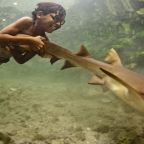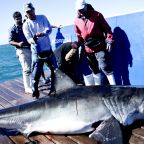
Hi students and aspiring shark biologists, this post will be constantly updated with the interviews and questions I answer for students about sharks, shark teeth, shark attacks, careers as a shark biologist and all those cool sharky things. If you have a project, and I am unavailable for an interview, please feel free to use these answers.
Ryan
STUDY / CAREER QUESTIONS
Q. Where did you study to become a shark scientist?
My introduction to shark research began in 1999, when walking along the corridors of the university of Pretoria’s Zoology department. A masters research program was advertised to study the impact of white shark cage diving on the ecology of the white shark and some associated species. Though a long story, I ended up on Dyer Island conducted my masters research on white sharks and aligned to the University of Pretoria and the governmental department – Marine and Coastal Management
Q. Where should I study to become a shark scientist?
If you are intent on becoming a shark biologist, then you don’t really have to worry about universities too much until postgraduate level. Shark biology is like all biology, and it is most important to gain the underlying principles of the natural world and conducting research before worrying about been aligned with a shark focussed department/university. At postgraduate level, it becomes vital that you find a university with a great professor who specialises in shark research and is willing to take you on as a graduate student. Finding such a professor, is pretty easy, look through the scientific literature for recent shark publications that you are interested in , this will identify great potential supervisors that you can approach.
Q. What subjects should I study to become a shark scientist?
At undergraduate level, biology is the basis of what you need to study. I would also throw in loving statistics as much of the analytical work will be statical based. For life, I would throw in a few basic business management and finance courses, as more and more shark biologists are running their own small institutes and finance and business are essential skills to understand.
Q. How much do I need to study to become a shark scientist?
The reality of this is that university is designed in different stages and to give you different skills. Undergraduate teaches a broad-spectrum of subjects and introduces the concepts of science and how knowledge is produced. It is, however, at honors level that you really learn the art of conducting science and research projects that will stand up to peer review and scientific scrutiny. Thus a minimum of honors is required to be a shark scientist. Masters (M.Sc.) level is about developing your skills to conduct research and publish your work, and then the PhD is that life altering mission to prove you are now a master of a field and can produce original research that drives a scientific paradigm forward. these two degrees are a great added bonus, but only take them on if you are ready to commit years of your life to become a shark academic.
Q. I am not going to study/have not studied can I still be involved in shark science / research?
I fully believe that few people are cut out to be full time academics and scientists, it requires a passion for knowledge and a willingness to commit huge amounts of time analysing and writing up research that gets very little recognition of appreciation by anyone other than a few other academics in your chosen field. The romantic view of the marine biologist living on the tropical island, launching the boat daily and heading out to play with sharks is a tiny piece of been a successful marine biologist. The commitment and responsibility of being a scientist goes so much deeper. But for the many people wanting to get involved, this does not mean you have to be a shark scientist. There are many careers and opportunities that do not require the commitment to study and publication and are still rewarding, for instance – scientific communicators, commercial divers, vessel skippers, ROV pilots, research technicians are all vital parts of research efforts.
Q. What is the best school / university to study shark science?
There is no best university or school. I have never gone to the best schools or had the greatest shark research mentors. I matched my academic studies with a huge amount of real world training and skills and have had plenty of opportunities. Like all successful shark scientists, it is about passion and commitment to this career, if you have that, and a willingness to put your passion before your financial needs, then you can make it regardless of what school or university you attended.
Q. I am 12 years old and I love to swim and snorkel. I snorkel a lot in the summer just to get used to swimming with fish. I would like to know is their any camps for me to go to learn to be a marine biologist.
In the states, one of our formers research interns is running a pretty cool shark camp, you can find info about this at: click here. I also know that the Bimni Biological field station in the Bahamas runs shark camps for school groups.
Q. Which college should I attend to do postgraduate research on sharks?
At postgraduate level, it will be a lot easier if you have an advisor in the field you are interested in.
Q. I want to be a wildlife TV presenter, how can I do that?
I wrote a blog on this that you can read here. In summery, get into a career that gets you working daily with awesome animals and let TV discover your work and then you. With an ‘I want to be on TV’ approach, you are not going to get anywhere in the industry that is based on finding authentic experts to drive films forward.
Q. I have not studied, what careers in shark research and conservation can I get involved with?
There are a huge amount of careers – tourism operators, dive guides, underwater videographers, research technicians, NGO directors, environmental educators, commercial divers, skippers, the list goes on and on. A lot of people who are incredibly active in research and conservation have full time ‘regular’ jobs and make their contribution part time as a passion project. Whilst the ‘marine biologist’ may be the most talked about position, many other professions are equally important in understanding and conservation sharks.
Q. Do you need an assistant?
Trufully no. My work is usually based around a small team of experts who I have worked with for many years heading out to do something that has never been attempted, documented or studied. For this I need full confidence in, and support from people I have worked with for years. However, my institute, Oceans Research runs some awesome internship programs that offer real world training in shark research and diving techniques. to learn more about these programs, click here
BIOLOGY/ECOLOGY QUESTIONS
Q. What is this shark tooth?
Feel free to send my a few high quality pics, and I will try to ID you shark tooth (info@ryan-johnson.me). Alternatively, a great resource to use is the Florida Museum Shark Tooth ID guide
Q. Why are sharks important to the marine ecosystem?
The basic idea that all species are equally important in an ecosystem is probably wrong if you take an approach of energy transfer through the tropic levels. The nature of the tropic levels, is that the higher up levels have a smaller diversity of species and fewer individuals. Thus you will find in any system few top predator species and few individuals compared to the lower levels. For this reason, removal of such top predators by way of a species, or taxa, is going to have a comparatively greater impact on a functioning ecosystem than at lower levels. If our goal is to have a healthy and functioning marine ecosystem then this is only possible with the pressence top predators
More reading:
- Shark savers – why sharks are important: click here
- Oceana – why sharks are important: click here
Q. What would happen if sharks disappeared?
The general consensus of the consequences of fishing out sharks is that we will see almost immediate swings in the entire ecosystem structure of the ocean. A seminal paper from the eastern seaboard of the USA illustrated a possible consequence. The reduction in large sharks caused a explosion in secondary predators (rays and smaller sharks) that increased the predatory pressure on their prey – shell fish. The consequence was massive tropic shifts, with the shellfish populations becoming decimated from the huge predatory pressure of secondary predators. This research was later critiqued and some floors found in the methodology and conclusions. But I still feel based on what we see in terrestrial systems, the swings and shifts in tropic levels will be the most immediate and visible impact of fishing out shark species.
More reading
- Scrips institution of oceanography: click here
Q. Is it true that sharks are becoming endangered? and why are they becoming endangered?
There are over 500 species of sharks in the world, and it is true that many of them are endangered. The internationally accepted classification system of species is operated by the IUCN (International Union for the Conservation of Nature) and groups species into 9 categories based on criteria such as rate of decline, population size, area of geographic distribution, and degree of population and distribution fragmentation. These categories include:
- Extinct (EX) – No known individuals remaining.
- Extinct in the wild (EW) – Known only to survive in captivity, or as a naturalized population outside its historic range.
- Critically endangered (CR) – Extremely high risk of extinction in the wild.
- Endangered (EN) – High risk of extinction in the wild.
- Vulnerable (VU) – High risk of endangerment in the wild.
- Near threatened (NT) – Likely to become endangered in the near future.
- Least concern (LC) – Lowest risk. Does not qualify for a more at-risk category. Widespread and abundant taxa are included in this category.
- Data deficient (DD) – Not enough data to make an assessment of its risk of extinction.
- Not evaluated (NE) – Has not yet been evaluated against the criteria.
However, when data is available (many sharks are categorized as ‘data deficient’), many species have been grouped into the the three threatened categories of: ‘vulnerable, endangered, critically endangered’. The reason for this is that the typical life history strategy is sharks is called a ‘K selected’ approach. This is the approach of many top predators, and is based on animals been (a) long lived, (b) having few offspring with a high probability of survival and (c) maturing late. The problem with this life history, is when a predator such as humans starts exploiting them, the shark populations are very poor at resisting such exploitation and slow at recovering from such exploitation. Due to the demand for shark fins from Asia, many species of sharks have been heavily targeted by fishers in the last 30 years, and as their life history is poorly designed to resist such fishing pressure, the populations have plummeted and thus been categorized as threatened.
For further reading check out the ICUN website: Click here
Q. What did the sharks looked like in the past? and how have they been changing from the past to today?
Sharks have been in the oceans for over 400 million years. Essentially to be classed as a ‘shark’ you require a cartilaginous skeleton (not boney) and a few other things – been a fish for instance. Thus sharks are a fish with a cartilaginous skeleton that have swum the oceans in different forms for the past 400 million years. If you look at sharks today, you have massive filter feeders, tiny cookie cutter sharks, species that can crawl on land, the classical predators such as the great white, camouflage experts such as the wobbegong. There is not limit to the shape and size of sharks, so long as, they conform to the classification requirements of a cartilaginous skeleton. This diversity of shape, size, distribution also existed into the past. Thus as a taxa (all shark species) it is impossible to say what they looked like in the the past, in a similar way that it is impossible to say what animals looked like in the past. The diversity is what makes sharks to awesome to study and research – you never run out of questions to ask.
SHARK HUMAN INTERACTION QUESTIONS
Q. Do you know why sharks are injuring humans? and why
Shark injure humans when that bite us. This is a very rare event and occurs occasionally when sharks and humans come across each other in the water. There are potentially numerous reasons why sharks bite us. Below are a few of the more likely reasons
- Defense to harassment – When an animal feels threatened by another, the types of responses they can have are based on the three ‘F’ – Flight (run away), Fight (turn an attack, and Freeze (stay still and hope it goes away because it thinks you are dead). When sharks are hooked and caught by fishermen they are obviously feeling threatened and harassed but cannot escape. On board they may look dead or unresponsive, but many a fisherman has underestimated the sharks fighting ability, and received severe bites following the harassment of a hooked shark in the shallows, on a beach on on a boat. In addition, human divers can also harass as shark, and if the shark is cornered (e.g. in a cave or gully) with no escape path to flee, then it can turn and attack a human. The grey reef sharks is well known for this, and often indicates to humans that they are upset by gaping and lowering their pectoral fins. If you are a diver and you see this kind of display, it means that a shark is not happy with you and you should back off to give it space.
- Mistaken Identity – Species such as the great white rely on initiating an attack on its natural prey (e.g. a seal) from a distance, coming at hi speed and attacking. In these cases, there is limited amount of time for a shark to take in important identification cues that could tell it if it is a particular prey (seals) or non prey species (humans). It is in essence a ‘hit first, ask questions later approach’. IN such case, the rough shape of a human, also a human on a surfboard, can resemble a seal, and cause a shark to attack thinking that it is attacking its natural prey – seals. Why we know that these sharks are not targeting us, knowing that we are humans, is that they typically bite once and leave us alone. If they were targeting us a food, then they would routinely consume us (which is not the case).
- Investigation (curiosity) – There are good arguments that sharks will investigate us to determine what we are, and if we are edible. The problem with this, is that a shark does not have hands and its primary feature to investigate the something like us is through its mouth. In a similar way to how babies determine weird objects by putting it in there mouth, sharks do the same. Unfortunately, what is deemed as a small investigatory nibble by a shark can have dire consequences on our soft and weak bodies.
For further reading on why sharks bite humans, read this blog by the Save our Seas Foundation. click here
PERSONAL QUESTIONS
Q. Why did you become a shark biologist
I grew up in New Zealand, a country where you become entwined with nature from the very beginning. Thus everything I did was outside and in nature, and when getting to that stage of university, I knew biology and zoology is what I wanted to study and build a career in. After traveling to Africa, I spent a year in Pretoria (that is landlocked) conducting research on Africa mammals, but I realized having come from an island nation, that the sea was an essential part of me. When the opportunity came to transfer my research skills into shark research, it was the opportunity I had been waiting and preparing my whole life for.
Q. What was your break that allowed you to become a shark biologist?
Preparation – I had studied, got good marks, and thus was qualified to take advantage of an opportunity to become a shark researcher.
Sacrifice – the first project I applied for, involved living on an island with one other person (who I did not know) for a year and taking a boat out daily to conduct data collection. There were 8 other applicants, but all dropped out when they heard about the living conditions. I was prepared to say yes and got the position.
Opportunity – I was on the look out for my masters research project, and instead of walking past a small A4 poster about a random project I went for it. My break was that, a poster on the wall of my university department. I saw it, immediately knew I wanted that project, I was prepared academically (and some other skills) and was ready to sacrifice anything to get the position.
Q. How did you get to host documentaries?
I was conducting my great white shark research in Gansbaai in 1999. A cage dive operator whom I knew (Marine Dynamics and Andre Hartman) got hold of me saying that they were organizing an National Geographic shoot with Dr. Brady Barr, and they the production crew wanted to feature a scientist working on great whites. Despite been somewhat inexperienced, I was one of only two researchers conducting research around Gansbaai (Michael Scholl being the other). Naturally I jumped at the chance, and hosted Brady and his team for a few days. Since then, there was a constant stream of film crews including my research in their documentaries. During this time I become more comfortable on camera and aware of the incredible impact media can have on raising awareness about sharks. In 2007 producer Stefani Muller found out about my work, and my discovery of night time hunting in Mossel Bays great whites. She developed a full documentary on this work for me to host, we made a pitch film, headed up to the wildlife film festival (wild talk) in Durban and pitched on stage to international broadcasters. They loved it, Nat Geo commissioned it, we made the doco and I have been getting work in shark and marine predator documentaries since.
Q. What is your favorite shark and why?
I don’t have a favorite species of shark, as I like different aspects of different sharks. Also, once I swim with a new species, then it automatically becomes a favorite for the next few months! Naturally the great white holds a special place, as this was the shark I first worked with, and a species that I have spent 1000’s of hours interacting with and studying. But loads of other species excite me equally. The seven gill cow shark is just weird and very different than most species I dive with, the mako is incredibly inquisitive and willingly interacts with you, the whale shark is just massive and beautiful. There are sooo many cool species out there!
Q. At what age did you find out you loved sharks? And which one did you love the most?
It was around 20 after I saw my first great white shark. Before that, I was like most children growing up in the ‘Jaws’ era. I was fascinated by the danger and charisma of sharks, but I did not love them. I still don’t know if I love them in away your love your pets or friends and family. For me it is about total respect, admiration and knowing that they deserve a place on this earth and that it is not the right of humans to destroy 400 million year of evolution for a bowl of soup. See my answer above for white is my favorite shark species.
Q. How old were you when you moved to South Africa and why did you move to South Africa?
I was 20 when I moved to South Africa from New Zealand. The reason I moved was that as an aspiring zoologist, I wanted to experience and live in Africa. One of my professors at Waikato University (in New Zealand) had arrived back from Africa mid term and given us some incredible lectures on her research. I wanted to experience that and approached her to help me transfer across. Since I was getting ‘ok’ marks, she said great, and put me in contact with her colleagues at the University of Pretoria.
Q. How did you feel when you first saw a great white shark?
I was with a few other students in Gansbaai, South Africa when I saw my first great white shark. I just remember thinking this thing is like an underwater bus!
Q. Why did you choose to study the shark?
For me personally, my life was always going to be outside and working with animals in some form. But growing up in an island nation like New Zealand, I never realised how closely aligned the ocean was with me until I spent a year in Pretoria which is land locked. When the chance came to spend a year on an island studying sharks, that was it for me.
Q.Where do you do most of your research on these sharks?
Our primary research station is at Mossel Bay, South Africa. This is an incredible research site due to the ease and accessibility of great white sharks, and that there is only a single cage diving operator, thus limiting the impact this has on the natural behaviour of sharks in the bay.
Q. What do you do with the information that you gather?
In the last few years, many students have become part of the institute, and as such they are driving most of the new research and questions that we are asking. The nature of any scientific project is that you ask a specific question, determine research methods to answer it, and use those research methods to collect the information. The primary ongoing research question concerns the population ecology of the great whites in south Africa. The information we collect for this is photographic ID, gender information and size information.
Q. Why did you choose the Great White Shark above all of the other sharks that you could do research on?
The opportunity arose for me to work on the great white. At the time, the cage diving industry was becoming established, there had been a number of great white shark attacks on humans in South Africa, thus the government had prioritized research on the great white and the cage diving industry. It was due to this species and issue becoming a national priority that my work initially focussed on great whites.
Q. What is the most interesting thing you have learned about the Great White Shark?
They can migrate from South Africa to Australia and back.
Q. Have you ever been bitten by a shark? If not, can you tell about a time you nearly got bitten by a shark?
No I have not. One of the few times I got close was when I forgot about some sardines in my dive BCD and went on a night dive with sharks. They were buzzing us, charging us, and essentially chased up back to the boat. It was only afterwards that I found the sardines and worked out why they were so aggressive. I wont ever put fish things into a BCD again!
Q. Why do you like to researching sharks, what makes you interested about them
My passion has always been for nature, the world we live in, and the wonders of the animals that we share this earth with. In truth, I should be equally happy conducting research on mice, elephants, polar bears or algae. Academically I am equally drawn to all species and ecosystems in my bid to understand the dynamics of the natural world. However, sharks are special to me. I think much of this stems from my childhood and growing up in a island nation (New Zealand) where you are very connected to the oceans. Spending one year in a landlocked city (Pretoria) was enough for me, and I released that I needed to be on the oceans. With my desire to learn and understand nature, and also to be on the ocean, sharks represented a wonderful species for me to conduct research on. In addition, that sharks were incredibly understudied and were been heavily exploited gave my mission meaning and context, and I knew I could make a difference to the health of the worlds oceans by working with sharks.












